The “Americanizer” and Other Tales of Translation
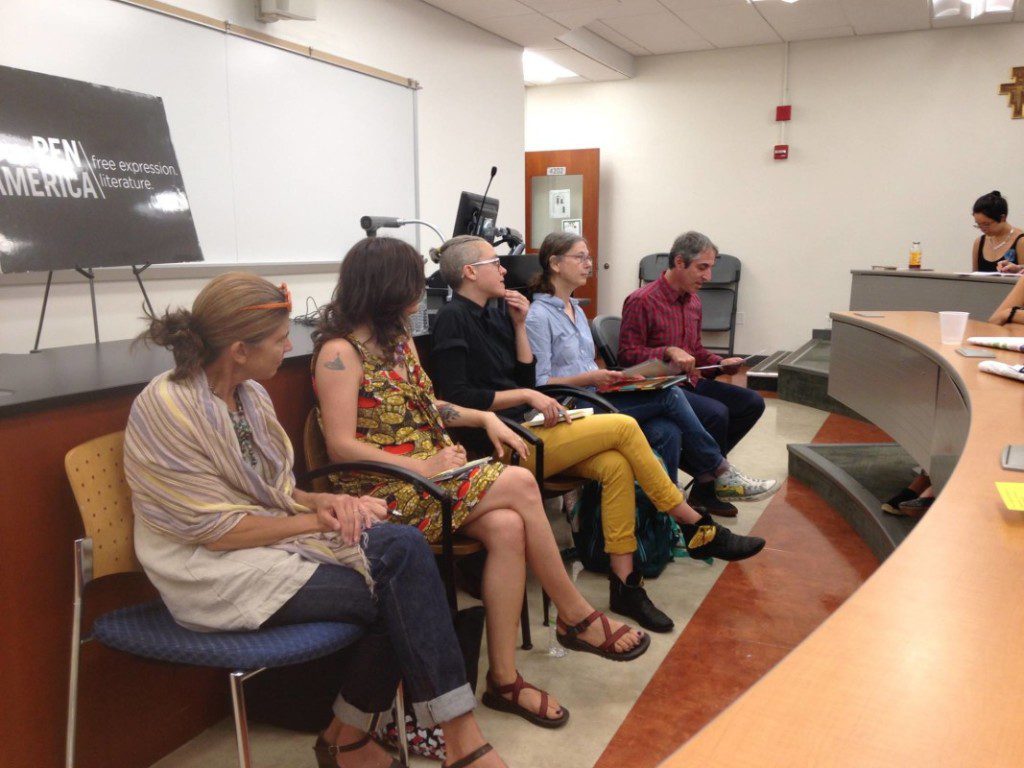
Panelists at the Brooklyn Book Festival, from left, Claudia Bedrick, Mara Lethem, Julia Heim, me, Alex Zucker. Photo by Margaret B. Carson. Used with permission.
I was heartened to see the jam-packed room at the “PEN Presents: Translating Books for Youth” panel at the Brooklyn Book Festival on Sunday. The 40 or so in attendance in the fourth floor room, accessible only by a small elevator and a tucked-away escalator at St. Francis College, rivaled the audiences at the more centrally located panels with big-name speakers and well-heeled corporate sponsors. Furthermore, our audience stayed for the entire presentation, which I consider another sign of success. I’m grateful to all the people who showed up and who spoke with us afterward. And I’m grateful to the organizers of the Brooklyn Book Festival for this and many other wonderful exhibits and events in support of all aspects of diversity, and in support of small presses and freedom of expression.
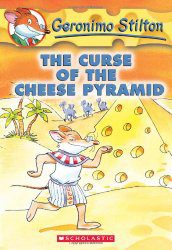 Alex Zucker did a great job of moderating the panel, and his PEN Translation Committee co-chair, Margaret B. Carson, took valuable photos and notes. We started off with a questions about the importance of publishing translations for young people and acknowledging that these books are translations. Claudia Zöe Bedrick, the publisher of Enchanted Lion Books, observed that books in translation open up a dialogue about the countries from where these books come. Reading is a way that children learn about things that are unfamiliar. Mara Lethem, who recently returned to the United States after many years of living in Barcelona, Spain, described U.S. literary culture as insular, more of a culture of export than import. Julia Heim, one of the translators of the best-selling Geronimo Stilton series from Italy, pointed out that acknowledging translators supports their work; after many years of working on this series for Scholastic, she was finally given credit as a translator. I added that when young readers in the United States aren’t exposed to the literature of other countries because publishers and other gatekeepers see these books as “weird,” they are consigning our young readers to second-class global citizenship. If young people don’t have exposure to diverse cultures, they will be less able to adapt, leaving them at the mercy of local and global economic and political forces, with opportunities closed off to them.
Alex Zucker did a great job of moderating the panel, and his PEN Translation Committee co-chair, Margaret B. Carson, took valuable photos and notes. We started off with a questions about the importance of publishing translations for young people and acknowledging that these books are translations. Claudia Zöe Bedrick, the publisher of Enchanted Lion Books, observed that books in translation open up a dialogue about the countries from where these books come. Reading is a way that children learn about things that are unfamiliar. Mara Lethem, who recently returned to the United States after many years of living in Barcelona, Spain, described U.S. literary culture as insular, more of a culture of export than import. Julia Heim, one of the translators of the best-selling Geronimo Stilton series from Italy, pointed out that acknowledging translators supports their work; after many years of working on this series for Scholastic, she was finally given credit as a translator. I added that when young readers in the United States aren’t exposed to the literature of other countries because publishers and other gatekeepers see these books as “weird,” they are consigning our young readers to second-class global citizenship. If young people don’t have exposure to diverse cultures, they will be less able to adapt, leaving them at the mercy of local and global economic and political forces, with opportunities closed off to them.
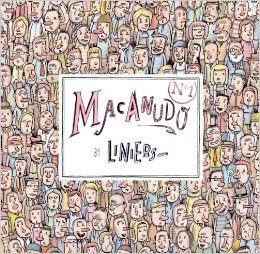 We then spoke about how translating for children is different from translating for adult readers. I kicked this discussion off, mentioning the role of gatekeepers because the younger the readers are, the less likely they are to choose their own books. Julia talked about the “dumbing down” of children’s books in the United States, as children in Italy are exposed to longer words at an earlier age. Mara talked about onomatopoeia and how it’s represented in different languages, how to translate fart jokes, a barking dog in Spain that goes “boop boop,” and whether “zzzzz” is the universal representation of snoring. She pointed out that when fewer words are involved, each word carries greater importance. Both Mara and Claudia discussed the process of working with illustrators and the special challenges of translating a children’s book that may not coordinate with the illustrations in the new language. Often, the illustrations must be changed, not only for linguistic but also for cultural reasons.
We then spoke about how translating for children is different from translating for adult readers. I kicked this discussion off, mentioning the role of gatekeepers because the younger the readers are, the less likely they are to choose their own books. Julia talked about the “dumbing down” of children’s books in the United States, as children in Italy are exposed to longer words at an earlier age. Mara talked about onomatopoeia and how it’s represented in different languages, how to translate fart jokes, a barking dog in Spain that goes “boop boop,” and whether “zzzzz” is the universal representation of snoring. She pointed out that when fewer words are involved, each word carries greater importance. Both Mara and Claudia discussed the process of working with illustrators and the special challenges of translating a children’s book that may not coordinate with the illustrations in the new language. Often, the illustrations must be changed, not only for linguistic but also for cultural reasons.
This brought us to the third question, the degree of “Americanization” in translated children’s books. In the case of the Geronimo Stilton series, this is a major issue. The books are written by a team in Italy and translated by a team in the United States. Julia is only one of several who work on the initial translations from Italian. From there, the texts go to a special team member called an “Americanizer,” who flattens out the text and makes it culturally familiar. For instance, in the original, there are a myriad of cheeses but in the U.S. version, there are only a few — cheddar, American, and Swiss. However, because the series is published by a Christian publisher in Italy, though with a generally secular approach to moral instruction, there have been no issues of “inappropriate” content. That was not the case with the book I translated, The World in a Second. Armed with copies of the Portuguese original and the translation, I showed the audience the original illustrations of a barbershop in the Azores, complete with calendars featuring topless and otherwise scantily-clad women (what author Isabel Minhós Martins described to Carla Maia de Almeida and me in May as “the nudies”). I then showed the revised illustration that we requested from Bernardo Carvalho that has allowed the English version to pass muster with U.S. gatekeepers.
Mara commented that in some cases, translation is a transformation that doesn’t flatten the book but creates a culturally rich book in its own right. That’s the case with her Macanudo series from the Argentine cartoonist Liniers. As an admirer of U.S. culture, he was thrilled to have his work translated into English and appreciated the elements that seemed to him a kind of “homecoming.” We all agreed that as translators, we too are authors of the work, and our choices of what to translate and how to translate it have impact for ourselves and our readers.


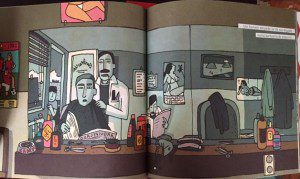
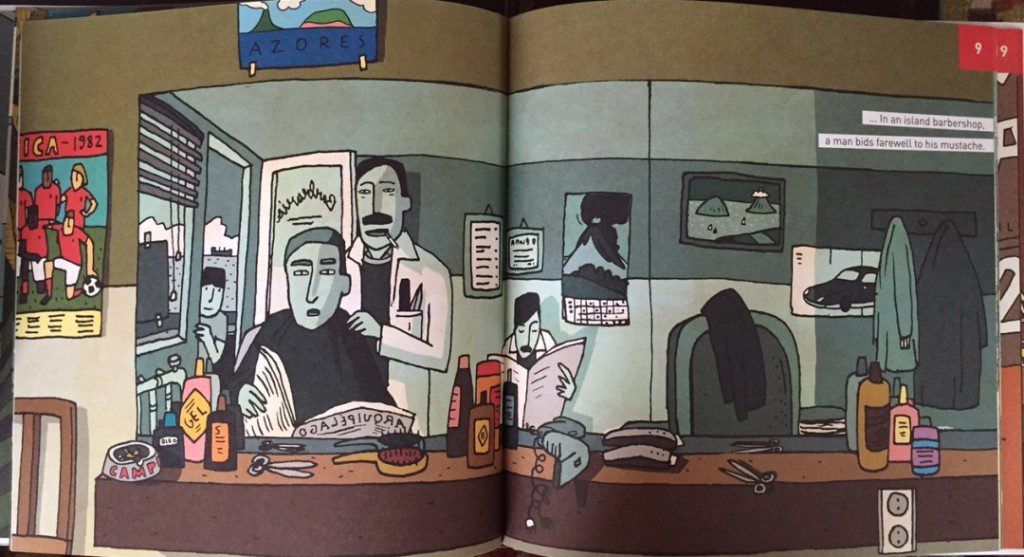






I enjoyed this look at translation here in the States and abroad. So interesting, Lyn. I’m glad you’re part of the process. I wondered how cultural idioms and such were translated. Nice to know there is a team effort.
We didn’t talk much about the translation of specific cultural idioms except for onomatopoeia. There were so many topics that we couldn’t get to because of time, but that means we’ll have to propose many more panels in the future!
This panel looks like it was amazing!
Thank you, Avery! And thank you for spreading the word about it!
I loved this post! Really fascinating!
Thank you, Mercedes! I’m attending a translation panel next month that includes Claudia and Mara, and I plan to report on that one as well.
Thanks for this post, Lyn! This sounds like it was a great panel: wish I could have been there! It was so very interesting to read what Julia Heim said about how Scholastic works with their Geronimo Stilton books, especially because I’m the translator of the Geronimo Stilton Graphic Novel series, a separate Stilton series published by a small, independent house. And I love Mara’s comment that “translation is a transformation that doesn’t flatten the book but creates a culturally rich book in its own right.”
I’m interested in how an independent publisher handles the cultural differences. For instance, are there more variants of cheese? It would be great to get you two together for a panel specifically focused on approaches of large corporate publishers vs. small presses.